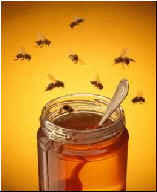A clear majority of EU countries have supported the European Commission proposal to temporarily ban three pesticides that are scientifically shown to be harmful to bees: imidacloprid and clothianidin, produced by chemical company Bayer, and thiamethoxam, produced by Syngenta. The following member states voted against the European Commission proposal: CZ, IT, HU, RO, SK, AT, PT, UK. The following member states abstained: IE, EL, LT, FI. The other member states were in favour. Greenpeace EU agriculture policy director Marco Contiero said: “Today’s vote makes it crystal clear that there is overwhelming scientific, political and public support for a ban. Those countries opposing a ban have failed. Now, the Commission must draw the only conclusion possible and immediately halt the use of these pesticides as a first step to protect European food production and ecosystems. Any further delay would mean giving in to the lobbying muscle of Bayer and Syngenta.” The three pesticides are all neonicotinoids, pesticides that are used to coat seeds before germination, added to soil or sprayed on plants. Greenpeace European bees campaign coordinator Matthias Wüthrich said: "Bee decline is one of the most obvious and visible effects of a failed industrial farming model, which contaminates our environment and destroys farmers' smartest natural ally - pollinators. European policymakers should shift funding away from chemical-intensive agriculture and promote ecological farming."
There was ferocious lobbying both for and against in the run-up to Monday's vote, the BBC's Chris Morris reports from Brussels. Nearly three million signatures were collected in support of a ban. Protesters against neonicotinoids rallied in Westminster on Friday. Campaign organiser Andrew Pendleton of the environmental group Friends of the Earth said "leading retailers have already taken action by removing these pesticides from their shelves and supply chains - the UK government must act too". "Pesticides aren't the only threat bees face - that's why David Cameron must urgently introduce a Bee Action Plan," he said. Chemical companies and pesticide manufacturers have been lobbying just as hard - they argue that the science is inconclusive, and that a ban would harm food production. The UK government seems to agree with the industry lobby. It says it cannot support the proposed ban in its current form. The chief scientific adviser, Sir Mark Walport, has said restrictions on the use of pesticides should not be introduced lightly, and the idea of a ban should be dropped.
The EU moratorium would not apply to crops non-attractive to bees, or to winter cereals. It would prohibit the sale and use of seeds treated with neonicotinoid pesticides. The deadline for implementation would be 1 July this year, not affecting the forthcoming sowing season for maize.
There would be a ban on the sale of neonicotinoids to amateur growers.
Sources:
Greenpeace, 29 April 2013
http://www.greenpeace.org/eu-unit/en/News/2013/Majority-of-EU-countries…
BBC News, 29 April 2013
http://www.bbc.co.uk/news/world-europe-22335520
Buglife, 29 April 2013

- Log in to post comments
